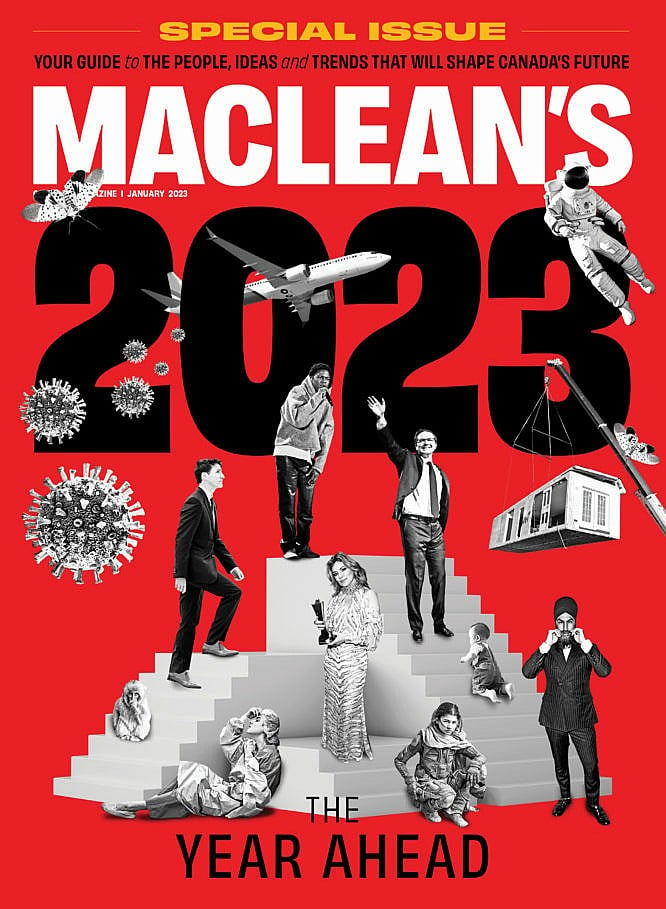The Year Ahead: Business in 2023
“In other words, fasten your seatbelt”

Cut-rate airlines will finally make air travel cheaper again—just don’t expect movies, munchies or any other on-board extravagances. (Illustration by Selman Hosgör)
Share
This story is part of our annual “Year Ahead” collection. Read the rest of our predictions for 2023 here.
Supply chains will freeze while air-travel choices expand. Tech unicorns prove resilient, the cannabis retail boom goes bust and everyone wants a side of feel-good social responsibility with their profits. Here’s a look at the year ahead in the world of business:
1. This recession will hurt after all
It’s tough being Tiff Macklem. The Bank of Canada governor spent 2022 fighting inflation with single-minded zeal, raising interest rates at every opportunity. Now a different problem looms: a recession. Opinion differs on how severe the downturn will be. Expectations of an almost painless recession have given way to fears of a crash landing, to be felt most acutely in housing, with reduced home-building activity, and in manufacturing, which could grind to a halt. Trade with the U.S. will slow, people will buy fewer cars and appliances, and the plastic, metal and lumber industries will all feel the pinch. In other words, fasten and tighten your seatbelt.
2. More workers will unionize
Forget the Great Resignation. This is poised to become the year of the Great Unionization. Following successful labour action and organizing at Starbucks, Indigo and Amazon, more workers will agitate for better wages and improved working conditions. Much of this is driven by pandemic hardships that left workers feeling vulnerable and underpaid, particularly those deemed essential in the early days of COVID—including health, education and food-delivery workers. In the U.S., public support for unions is at its highest since 1965, and Canada has similar numbers. There were 48 strikes or lockouts in Quebec last summer, involving more than 10,000 workers, including Agropur Dairy employees and Via Rail operators. In Ontario, CUPE education workers staged a dramatic November walkout in opposition to a provincially imposed contract. As Unifor president Lana Payne put it, “it’s definitely an organizing moment.”
3. There will be more flight choices
Air travel in Canada has always been costly and time-consuming, and recent labour shortages and service cuts have only made it more excruciating. But thanks to low-cost and no-frills airlines like Lynx Air, Swoop (WestJet’s discount carrier) and new kid on the block Canada Jetlines, that trip to visit your in-laws just got a little bit cheaper. Jetlines still only operates a single Airbus A320, but the expansion of Lynx—it begins flying to Orlando, Phoenix and Las Vegas later in 2023—will herald a new era in Canadian budget travel.
4. Open banking will arrive, for better and for worse
The idea behind open banking is simple: it enables consumers and businesses to easily and safely move their financial data between banks and other financial-service providers, such as fintechs (think Wealthsimple or FreshBooks). But the made-in-Canada approach developing in Ottawa has been bumpy so far. Working groups between fintechs and the feds only began meeting last summer, behind schedule, and critical questions around governance—accrediting participants, handling disputes, managing security—remained unresolved as fall turned to winter. Canada’s open-banking lead, Abraham Tachjian, swears everything will be ready in 2023. But don’t expect a smooth rollout.

5. The cannabis retail bubble will pop
In most Canadian cities, it’s now easier to find an edible than a parking spot. But the oversaturated cannabis market is about to change dramatically, with a wave of closures and consolidations in the coming year. Some industry experts predict a full third of the country’s 3,000-odd weed shops will shutter by the end of next year. The news is even worse for Canada’s pot stocks, which have already cratered. Last October, the once-mighty Canopy Growth Corporation was down more than 75 per cent year over year, and Aurora Cannabis was trading at 98 per cent below its all-time high. While some suggest the industry is just rebalancing itself and long-term prospects remain good, this reckoning has us reaching for an old adage—smoke ’em if you got ’em.
6. Bay Street will double down in the fight against climate change
Despite backlash south of the border, environmental, social and governance investing—i.e. investing in businesses promoting environmental and social good—is alive and well with Canadian businesses, banks and pension funds. ESG is great PR, and in a world increasingly upended by the climate crisis and social-justice issues, it makes good financial sense, too. The fuzziness around what constitutes true ESG investment, a question plagued for years by iffy regulation, is also clearing up. Former federal environment minister Catherine McKenna now chairs a UN committee dedicated to developing standards to prevent businesses from greenwashing their reputations, and the harmonization of standards by the International Sustainability Standards Board have made such investments more bulletproof.
7.The Shopify unicorn will survive
At the height of the pandemic, Shopify was the Apple of e-commerce, its online retail platform the go-to solution for seemingly every bricks-and-mortar company pivoting to digital. But its explosive growth—a 110 per cent increase in revenue, year-over-year, in the first quarter of 2021—proved fleeting. With shopping malls once again full in 2022, the company’s growth slowed and its stock tanked hard. It laid off 10 per cent of its workforce last summer and more in the fall. Yet things are once again looking up for the company; its lower stock price has made it an attractive buy again, and online shopping isn’t going anywhere in the long run. The Shopify Era has only just begun.
8. Wattpad will rewrite the entertainment industry
A few years ago, Wattpad was a curious Canadian success story, an interactive online publishing platform that promised to revolutionize the publishing industry. That early genius—turning user-generated stories into saleable IP—proved irresistible. Since its $754-million acquisition by South Korean internet company Naver in 2021, the company has become a global juggernaut. Wattpad now collaborates with K-pop stars, regularly makes films, TV and comics based on its web novels, and has partnered with companies like Spotify to produce podcasts in the Philippines and Indonesia. Twentieth-century pop culture belonged to Walt Disney and Stan Lee; Wattpad founder Allen Lau may own the 21st.
9. Supply chain snafus will strike everywhere
Supply chain delays still bedevil Canadian consumers, and the run on automobiles, electronics, microchips, furniture and much more shows no sign of abating. Auto manufacturers expect they’ll need to cull more than four million vehicles because of a lack of chips for computer systems. Volkswagen expects the shortage to continue well into 2024. What could be worse than that? How about a looming coffee shortage? Weather issues, a lower-than-normal supply of arabica and robusta beans, and crop-hoarding exporters in Brazil are all contributing to that brewing crisis. Stock up on your Tim’s while you can.
10. Consumers will demand companies go green
“Conscious consumption” has been popular for decades. But ethically minded shoppers are now devoting their dollars to B Corps: rigorously monitored businesses that believe a business’s purpose should go beyond profit, encompassing environmental and social responsibility as well. There are now more than 4,000 certified B Corps worldwide, including Canadian companies like 100km Foods, Kotn and Assiniboine Credit Union. Montreal’s Goodee, a purveyor of sustainable furniture and gifts, is one especially beloved exemplar. A Black-owned business inspired by the UN’s sustainable development goals, it recently launched an apparel line, so you can look as good as you act.
This story is part of our annual “Year Ahead” collection. Read the rest of our predictions for 2023 here.
This article appears in print in the January 2023 issue of Maclean’s magazine. Buy the issue for $9.99 or better yet, subscribe to the monthly print magazine for just $39.99.
